 April 11, 2019. One
of our graduates, CA
agent Patrick Girukwayo,
conducted a
sensitization to 500
Youth (selected from
various background including
260 girls) gathered at
Mont Carmel for the “Journee
Inter-diocesaine de Jeunes”
in Goma, Democratic Republic
of the Congo. The session
was held in the framework of
encouraging Youth to support
peace and security in the
region. To recall, this meeting
gathered youth from DRC, Rwanda and Burundi
in the context when
MONUSCO (United
Nations Organization
Stabilization Mission
in the DR Congo) has
provided a logistical
support (tents, generators, office
material, water, …) to the
event. During the session, CA
explained:
April 11, 2019. One
of our graduates, CA
agent Patrick Girukwayo,
conducted a
sensitization to 500
Youth (selected from
various background including
260 girls) gathered at
Mont Carmel for the “Journee
Inter-diocesaine de Jeunes”
in Goma, Democratic Republic
of the Congo. The session
was held in the framework of
encouraging Youth to support
peace and security in the
region. To recall, this meeting
gathered youth from DRC, Rwanda and Burundi
in the context when
MONUSCO (United
Nations Organization
Stabilization Mission
in the DR Congo) has
provided a logistical
support (tents, generators, office
material, water, …) to the
event. During the session, CA
explained:
MONUSCO’s role in supporting
state authority
and peaceful cohabitation
among communities in Nord
Kivu, Goma.
The role of Youth in creating a positive and peaceful climate
through collaboration.
The role of Youth in identifying
key security and causes
of tensions (ethnic and
political) and timely alert for
preventive responses.
· The role of youth to support
the 1500 Youth leaders
through the 18 Youth committees
of GOAM who were
created in 2018 by CA and
the Ministry of Interior.
The culture of good communicating
with local actors in
denouncing every cause of
destabilization. How youth should avoid
political manipulation that
might to fuel ethnic and
community violence. In a
lively interactive and participative
discussion, youth
asked several questions on:
· How they can participate in
strengthening social cohesion
in their areas.
Enhance of young girls’
leadership in supporting
peace and security, etc.
Participants recommended
MONUSCO to organize sessions
of Leadership to key
authorities and encourage
them to include Youth in
State services and local
development priorities to reduce
Youth delinquency.
Patrick Girukwayo has completed
a Doctorate program in
Leadership & Strategic Planning
at Atlantic International
University.
 June 14,
2019. Dixie
State University
in
St. George,
Utah has
approved
of the class
that our graduate, Russell
Cashin, has created and that is
based on the graduate thesis he
completed at AIU. This is huge
news since the topic is so new
and cutting edge.
June 14,
2019. Dixie
State University
in
St. George,
Utah has
approved
of the class
that our graduate, Russell
Cashin, has created and that is
based on the graduate thesis he
completed at AIU. This is huge
news since the topic is so new
and cutting edge.  June 14, 2019.
Dr. Ricardo
Gonzalez,
Provost of AIU,
was courteously
invited,
on behalf of Conference Chair
Myung Chul Chang, to be an
Invited speaker at “OLC Nanotechnology-
2019” which will be
held on September 23-24, 2019
at Chicago, USA.
The theme of the conference
will be “Exploring the New
Challenges and Opportunities
in Nanotechnology and
Nanoscience.”
June 14, 2019.
Dr. Ricardo
Gonzalez,
Provost of AIU,
was courteously
invited,
on behalf of Conference Chair
Myung Chul Chang, to be an
Invited speaker at “OLC Nanotechnology-
2019” which will be
held on September 23-24, 2019
at Chicago, USA.
The theme of the conference
will be “Exploring the New
Challenges and Opportunities
in Nanotechnology and
Nanoscience.”
Prof. Myung Chul Chang is a
Director of Biomaterials Lab at
Kunsan National University,
Rep. of Korea, he completed
PhD at Seoul National University
and Postdoctoral studies
at University Illinois at Urbana
Champaign.
Here is an excerpt of the
invitation, signed by Rajinidevi
Bhimer, conference
secretary: “Your valuable
speech in the field of Nanotechnology
will raise enthusiasm
among prospective
attendees for participating in
Nanotechnology-2019”.
Visit
Interviews: www.aiu.edu/Graduation/grids/interviews.html
 June 7, 2019. One of our
graduates, Eugenia Padovani
de Arce, has published
a book (in Spanish)
titled, “New Shoes for
my teacher: Teacher
training,” in Lulu Publishing.
June 7, 2019. One of our
graduates, Eugenia Padovani
de Arce, has published
a book (in Spanish)
titled, “New Shoes for
my teacher: Teacher
training,” in Lulu Publishing.
Summary: Many teachers
have expressed that universities
have trained them to do an
excellent job, but when they
come to the classroom
they realize that what
they have learned is not
enough, they feel powerless
and overwhelmed.
Professionals do not receive
all the tools needed to do
their job —it’s like shoes, at one
point they get old or break.
Teachers have to be sensitive
to the personal needs that are presented to them, humble in
understanding that they don’t
know everything and to be
flexible to adapt. You have to
learn to love yourself first and
then care for the little ones,
you have to keep growing, if
not your shoes will get holes.
More information:
http://www.lulu.com/shop/search.ep?keyWords=Eugenia+de+Arce&type
Eugenia has completed a
Doctorate program in Psychology
with honors at AIU.
Latest News: www.aiu.edu/news.aspx
News Archive: aiu.edu/DownloadCenter.html

 June, 2019. These graduate students completed the majority of
the requirements to obtain honors, which included a 4.0 GPA,
published works, recommendation from their respective advisors,
patent a product, etc. Congratulations to all of them!
June, 2019. These graduate students completed the majority of
the requirements to obtain honors, which included a 4.0 GPA,
published works, recommendation from their respective advisors,
patent a product, etc. Congratulations to all of them!
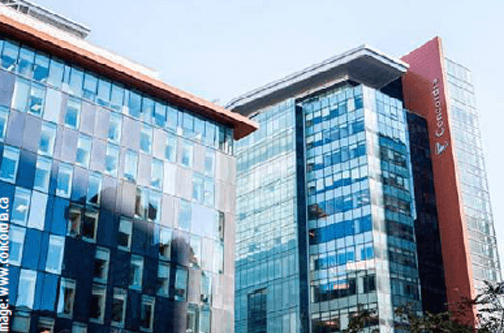 Call for Papers
Call for Papers
| Fazal Rahman Bachelor of Science Architecture Afghanistan |
José Lombongo Abel Bachelor of Business and Economics Business Management Angola |
Afonso Serrão Bamba Bachelor of Communications Social Communication Angola |
Silvina Adriana Perez Doctor of Biology Nutrition Argentina |
Alvaro J. Aparicio Master of Science Psychology Argentina |
Coral V. Pinder Master of Science Public Administration Bahamas |
| Gonzalo Carpio Deheza Doctor of Science Health Sciences Bolivia |
Nametsegang Tonkope Doctor of Philosophy Entrepreneursh ip, Research & Business Mgmt Botswana |
Olivia Azah Wando epouse Itoe Certificate of Science Animal Science Cameroon |
Tashmeni Singh Master of Science Healthcare Administration Canada |
João Paulo Gomes Rocha da Silva Bachelor of Science Information Technology Cape Verde |
Epainete Djangrang Sende Doctor of Science Public Health Chad |
| Eva Soledad Orellana González Doctor of Philosophy Organizational Development Chile |
Mary Yelly Londoño Calle Master of Science Homotoxicology Colombia |
Diana Paola Bocanegra Horta Doctor of Science Public Health Colombia |
Isaí Romero Castro Bachelor of Science Psychology Colombia |
María Eugenia Ballestas Camargo Bachelor of Science Nutrition Colombia |
Michel Kishala Kisimba Master of Science Electrical Engineering Democratic Rep ublic of the Congo |
| Omar Alejandro Estévez Estévez Doctor of Philosophy App lied Mathematics Science Dominican Rep ublic |
Vitalina Pietrobiasi Master of Business Administration Business Management Dominican Rep ublic |
Jorge Patricio Calderón Sánchez Master of Linguistics App lied Linguistics Ecuador |
Andrea Soledad Pinto Silva Bachelor of Science Food Engineering Ecuador |
Kimon Georgios Mademlis Doctor of Philosophy Marketing Estonia |
Hasmukh Lal Doctor of Business Administration Leadersh ip Fiji |
| Francisco Ndong Micha Akele Bachelor of Business Administration Business Administration France |
Ioannis Alepidas Bachelor of Science Renewable Energy Germany |
Mindjae Meyong Pricila Gertrude Bachelor of Science Health Care Management Ghana |
Henry Castro Doctor of Education Education Guatemala |
Alex Ekow Mills Master of Science Cyber-Security Japan |
Eugenia J. Padovani de Arce Doctor of Psychology Child Psychology and Education Japan |
| Erasmo Salazar Torres Doctor of Theology Moral Theology Mexico |
José Luis del Rio Gallegos Doctor of Business Administration Business Administration Mexico |
Ben A.G. Bambo, Sr. Doctor of Science Public Health Micronesia |
Abubakar Abdullahi Matazu Bachelor of Science Renewable Energy Engineering Nigeria |
Rosario Amparo Castillo Vigil Doctor of Health Science Microbiology Panama |
Amarilis Rivera González Doctor of Education Administration and Education Supervision Puerto Rico |
| Justin Bisengimana Doctor of Science Business Administration Rwanda |
Visuanathan Gopalan Doctor of Philosophy Education Singapore |
Sivarajasingam Mahendran Doctor of Education Education Singapore |
Adan Okash Ali Bachelor of Business and Economics Business Administration Somalia |
Roselien Marie Rotgans Doctor of Theology Contextual Theology Suriname |
Michael Angelo Mlauzi Doctor of Management Strategic Management and Leadersh ip Swaziland |
| Sakhumuzi Joel Simelane Bachelor of Science Information Technology Swaziland |
Happiness Garden Mengi Bachelor of Business Administration Banking and Finance Tanzania |
Robert Ismael Master of Projec t Management Project Management Tanzania |
Dania Anthonelle Rhonda Harry-Nero Doctor of Science Psychology Trinidad & Tobago |
Ahmed Attia A. Elimam Doctor of Philosophy Linguistics Turkey |
Cemile Aslı Üstünkaya Bachelor of Arts Business Administration Turkey |
| Leo N. Mancini Master of Science Health Science USA |
Russell H. Cashin Doctor of Philosophy Nutritional Psychology USA |
Shadi Rasem Eid Eid Doctor of Business Administration Healthcare Management USA |
Brima Kamara Master of Science Electrical Engineering USA |
Eugene Lupenga Bachelor of Business Administration Human Resource Management Zambia |
|
This month we have graduates from: Afghanistan · Angola · Argentina · Bahamas · Bolivia · Botswana · Cameroon · Canada · Cape Verde · Chad · Chile · Colombia · Democratic Republic of the Congo · Dominican Republic · Ecuador · Estonia · Fiji · France · Germany · Ghana · Guatemala · Japan · Mexico · Micronesia · Nigeria · Panama · Puerto Rico · Rwanda · Singapore · Somalia · Suriname · Swaziland · Tanzania · Trinidad & Tobago · Turkey · USA · Zambia

 Joseph Peters
Joseph Peters Felipe Gomez
Felipe Gomez Alex Mills
Alex Mills Kimon Georgios Mademlis
Kimon Georgios Mademlis
Summary
The world of new and
advanced technologies, such
as computer systems and
internet, far from making
man well educated and able
to interact continually with
others has resulted, so to say,
in mis-education and with no
morality. In a word, let me say
that there is a crisis in education,
as Muller has pointed out:
The present crisis in education
has arisen because the
enormous increase in human
knowledge and skill in
particular fields has meant
a corresponding loss of the
sense of wholeness… the
present industrialized world
takes account of nothing but
the technical requirements
for the continued functioning
of production in its countless specialized ramification; and
nature and history which
should reduce this process to
unity, seem but phantoms in
comparison with its obsessive
reality (Muller, 1968 214,215).
One may ask, what is so
interesting about education?
In fact what motivates me
to write on this topic is the
belief that there is a paradigmshift
in education. How is
this paradigm shift? Since
1960s, the system of education
in Mozambique has been
struggling in order to design
a specifics curriculum design
from primary to secondary,
(Palege, 2017).
From old system called
locally (Antigo Sistema in
portugues) to a new system
(Novo Sistema), introduced
gradual grade one up to grade
12, (Educere, 2013). The formal
curriculum design set by the
Portuguese colonial master
was put to an end, and then
the new curriculum design
comes in. The sustainability
of this curriculum depended
on the international financial
donor communities, (IND/
MINED, 2004).
The new financial donors
imposed a paradigm shift into
the curriculum of Mozambique
national system of
education. To receive money
from International Monetary
Fund or World Bank meant
to implement their rules and
budget procedures.
The outcomes did not
delay, today education efficiency
and quality is still
questioned, because we still
find many children with
difficulties in reading and
writing, many young men and
women with no abilities and
competences when employed,
(Bilale, 2007). The curriculum
design is not integrated to
the local cultural values and
traditions of the children.
Otherwise, if these curriculum
designs had good
impacts in people’s lives, to
get involved in civil wars,
ethnic discrimination, corruption,
nepotism would not
become everyday practices
or problems, neither could it
change constantly, because
good education gives values,
knowledge and morality. In
actual fact education is meant to for people, has to contribute,
to their families, villages,
and to the nation as whole
(Carlos, 2018); if the curriculum
cannot articulate to this
extent, this means it is not
efficient and effective.
To my understanding our
curriculum design is still far
from touching what Ubuntu
need; those in the rural area are
more vulnerable to the lack of
formal education than those in
the urban areas. Those in urban
areas are more likely to be involved
in crimes than those in
the rural, killing has become a
habit; man has turn into homo
hominis lupus, a latim saying
meaning man has become a
wolf for another man.
Therefore I think that to
engage in this philosophical
research on curriculum design
of educational system of Mozambican
was a big challenge.
It is my conviction that John
Dewey provides insight for the
renewal of African education
and a better approach of curriculum
design in the education
in Mozambique.
For John Dewey, education
is regarded as a necessity of
life; a renewal of life by transmission
of values, education is
communicating and transmission
of social values and
principles, education is self
learning experiences, (Dewey,
1931). To accomplish this research
I will use John Dewey
philosophy of education as
primary sources and Yusef
Waghid second source.
The structure of this thesis
is made of four chapters
whereby the first is dedicated
to Dewey’s biography and
his main ideals about his
philosophy of education. The
second deals with Dewey’s
principles of education, which
is the heart of this proposal
thesis. The third deals with an
overview Mozambican system
of education and curriculum
designs its changes along the
years. Then last chapter deals
with the principles as insight
into Mozambican curriculum
combined by African philosophy
of education, an approach
of Yusef Waghid.
The goal of this research
was to focus on the general
description of the pedagogical
problems and curriculum
design of Mozambique, and
from Dewey’s insights propose
a way of improving the new
local curriculum design.
The thesis has utility in the
professional careers because
it contributes to the analyses
and proposal of consistent
and solid curriculum design
that can be sustainable in
the system of education and
guarantee better engagement
of the students and teachers
in the learning process. There
were will be no need of changing
constantly the curriculum
design if cultural anthropology
contents are adopted in the
local curriculum. This will end
the existence of Mozassimilators
students in the curriculum
design.
a) Problem
of investigation
The lack of systematization
between the curriculum design,
the customs, cultural values
and traditions of ubuntu,
brought a separation between
local cultural values of the
people, and the Mozambican
System of Education. And
this was noticed in the early
days of 1920s of the introduction
of colonial era system of
education, (Palege, 2017). Since
1960s and after the colonial
era, Mozambican was forced to
introduce its own system and
curriculum design whose main
purpose was to rehabilitate
the economy and education of
man and women, and oppose
the colonial system, (Samora,
in journal, coleção e orientação,
1973.n.2).
After colonial war (1975) the
system of education adopted
a national policy of education
to guarantee the functioning
of the curriculum design,
and thereafter a new serial of
curriculum for basic level of
teaching and strategic plans
were introduced.
The curriculum introduced
for example in 2002, was the
reformulation of the other
older ones introduced in the
years 1964, 1975, 1983 approved
by law n.º 4/83, of
March 23rd and reformulated
again in 1992 by the law 6/92,
of May 6th, (MINED, 2003).
Unfortunately these curriculum
designs were not
efficient and effective because
of not including local values
and traditions, local languages
and ritual of passages, kinship
and clans, (MINED, 2003).
The Mozambican System of
Education went on introducing
new models, policies
and strategies, forcing the curriculum design to change
constantly, in order to adjust
to the reality. Later on in 2004,
introduced a program named
Plano Curricular do Ensino
Básico, which was modified
recently to Plano Curricular do
Ensino Primário (INDE/MINED,
3rd cycle, 2015).
b) Objectives
The main objective is to
analyze the curriculum design
shift of Mozambique; in order
to accomplish this objective,
specific objectives were underlined
namely: To understand
why so many changes in the
curriculum design; to evaluate
the differences in the various
curriculum designs presented
along the years; to look at the
effectiveness and efficiency of
this curriculum designs changing
along the various years.
The discussion on the
principle of education of
John Dewey, an insight to
Mozambican education ends
with the identification of the
constant shift of the Mozambican
curriculum design; and
this is seen as a major problem
for children not to assimilate
properly the knowledge and
competences necessary in
their education. John Dewey’s
principles of education are referred
as a solution combined
with Yusef Waghid African
Philosophy of Education.
John Dewey’s life and experiences
on education influenced
the field of philosophy
of education and thus defined
as the practicality of our
everyday life experiences. In
his principles, we can only account
for children’s education
through parental guidance in
cooperation with the nuclear
and large families.
A better education requires
democracy founded on
freedom of aims and on the
participation in the decisionmaking
of the contents chosen
by the community for their
infants. These contents locally
selected enable children to
easily integrate. Classroom
must be place where teacher
and students exercise, debates,
dialogue and negotiate.
Mozambique before colonization
had its own traditional
education system based on
communal values, habits
and customs, however with
the colonization, education
turned according to the Portuguese
system, imposing a
curriculum design.
The Portuguese curriculum
design had an aim to educate
natives or indigenous in order
to become civilized.
To overcome this situation,
Mozambican political system
(FRELIMO Party) declared war
against the colonial master,
and along the war in the
conquered areas or liberated
zones (1964–1974), introduced
its own education for their
population.
The curriculum design
applied for their students
was inherited and made
few changes to adapt to the
reality of Mozambican people
namely: to learn history and
geography from Mozambican,
to learn politics of war and
unite for wars. The language
used was Portuguese and not
local language as it used to be
before.
The major problem verified
in this curriculum design, is
that it did not account for the
local language, values, customs,
and traditions, neither
did account in finding what
could be taken democratically
for children education. There
is a paradigm shift from Portuguese
system to Mozambican
system of Education.
After independence up to
2004, Mozambican system did
not collect back the local values
and cultural elements, to
integrated in the curriculum,
instead it continued to develop
the inherited Portuguese
system and other influenced
models of curriculum design
(especially from those international
financial donors).
BIBLIOGRAPHY.
Dewey, John. Democracy and Education:
an Introduction to the Philosophy of Education. The Macmillan
Company, New York 1931. | “Experience, Knowledge and Value; A
Rejoinder”. The Philosophy of John Dewey: The Library of Living
Philosophers. Vol.1. North Western University, Press, Evanston
and Chicago, 1939, (517-608). | Instituto de Educação & Ministério
de Educação (INDE/MINED): Planco Curricular do Ensino
Básico, Maputo. 2003-2004 | Programa Curricular do Ensino
Primário, Maputo.2015 | Waghid, Yusef. An African philosophy of
Education reconsidered, on being human, Routledge,2013

The world in which we are
living, in which we see the
differences in the ways of acting
of those who inhabit this
planet and in which we ask
ourselves: who are we? Where
are we going? And more still:
where do they want to take us?
What is the concept that
manifests the thought that we
have just enunciated? That
concept is culture.
Culture through the history
of human thought has had
many definitions:
According to Clyde Kluckhohn
1905-1060, in his work
“Culture: critical review of the
concept and its definitions”
—1952, says that culture is the
form of behavior manifested
and acquired through symbols,
which demonstrate the unique
aspect of a human group.
You have to see Vermeer’s
painting, The girl of the
pearl, also called “The dutch
mona lisa” or Munch’s “The
scream”. These works express
a moment of the work of the
peoples who were the fatherland
of the authors.
Culture also has the meaning
of being immersed in the
work of a human group in
terms of the best that it does; referring to science and behavior
rules.
Culture and civilization for
the Saxon world are different
meanings: culture is tradition;
civilization: the current task of
a society.
In this article we will take
the concept of culture offered
by the United Nations Organization
for Education, Science
and Culture (UNESCO).
“Culture can be considered
as the set of distinctive
features, spiritual and material,
intellectual and emotional
they characterize a society or
a social group. It encompasses,
in addition to arts and letters,
ways of life, fundamental
rights to human beings, value
systems, traditions and beliefs
and that [sic] culture gives
man the ability to reflect about
himself. It is who makes us
specifically human beings,
rational, critical and ethically
committed”. UNESCO. (1982)
World Conference on Cultural
Policies: Mexico.
If culture makes a photograph
of who we are as
human beings, what is happening
nowadays so that
this photograph can be seen, many times, so opaque?
Culture is this or the other
“task” of any human being
without any distinction of the
place of the planet where it
inhabits.
Culture is everything that
represents each human group.
Unfortunately the world in
which we are living today confuses
Culture with economic
power and we see the way in
which some human beings are
treated only because they live
in countries, which according
to the purchasing power
of their inhabitants, are not
considered rich.
“The development of the
industry has been done not on
the soil of the preceding civilization,
but transforming traditional
society upside down,
deporting the peasants in masse to the suburbs, breaking
ties and solidarities under the
monetary relationship, ruining
the millenary cultures…”.
(Morin, 2011, p. 21).
Today we live the devaluation
that is made of this human
being or the other; of this
country or the other because
they are considered poor.
The development of capitalism,
Globalization, tries by
all means to erase cultural
differences to create a world of
needs convenient to marketing.
That is why even aid
programs that help the owners
of capitals have more wealth
are generated.
“The aid hydraulic approach
ignores what I have argued
as the central problem, that is
that large amounts of aid, corrupt
local politics in a way that
makes development more difficult.
You can’t develop from
the outside to the countries of
other towns with a supermarket
list for Home Depot, no
matter how much you spend”.
(Deaton, 2015, p.348).
According Deaton, help, forgetting
the reason for being of
those peoples is not possible;
you have to see, from within,
and that seeing from within is
knowing who they are and respecting
what they are. When
he talks about a list for the
supermarket is to forget what
those human groups are, and
to try to make them according
to our way of thinking.
It is wanted to generate
in those towns necessities
convenient to the market and
treats to those human groups
and their inhabitants like of
lower culture.
“...when I speak of freedom
I mean the freedom to live a
new life and to do the things that make life worth living”.
(Deaton, 2015, p. 18)
The countries of big capitals
are proud to say that they are
model countries of freedom.
Therefore, what we see is
that we need to recognize
others as equals, accepting the
differences in the way of life
they have learned.
All of us must have to respect
for the singular, respect
for the traditions, for the
history of the other peoples,
for the way of seeing life and
giving them what we consider
to be good, always explaining
the reason and waiting for the
acceptance of the others.
Atlantic International University
(AIU) as an international
university has students
and educational and administrative
staff from a lot of
countries around the world.
AIU has been integrated into
validation institutions and
UNESCO.
The university has an
organizational development
model that recognizes and integrates
the different cultures;
the model is “AIU Comprehensive
Culture” which has
been defined by the following
concepts:
1 Andragogic. The adult in
his way of learning.
2 Unique and irrepetible.
No person is equal to
me. I am myself and my
circumstances.
3 Gamification and ludification.
The game also
teaches.
4 Human rights. All human
beings have my rights and
opportunities.
5 Exponential growth.
Look for knowledge
and differentiate it from
information.
6 Multidimensional. Create
the forms of language to
understand the other that is
equal to me even if i live at the
other end of the planet.
7 Multifunctional. Everything
we do brings
its physical and emotional
consequences.
8 Multidisciplinary. Accept
that the world is a whole
even if we learn by disciplines.
9 Multiinteractivo. Always
look for balance in relationships
with others.
10 Multifactorial. Give
opportunity to the
other for integration.
11 Disruptive. Change
for elements that operate
better.
12 Holistic. Every human
being has a concept of
what his happiness is, which
we must respect
13 Asynchronous. Have
the benefit of accommodation
to different aspects
of life.
The above principles are intended
for the members of the
AIU community to integrate
into the University as if it were
in their countries of origin;
as if his fellow students were
those of his community.
The previous principles generate
that the students feel as if
their Advisors were their close
teachers, as if their Tutors were
the administrative assistants
and the teacher's assistants
that they had in their spaces of
existence.
The previous principles make
AIU the home land according
to Morin: here we all fit, here
we are all important and here
we are all worth what we are:
Unique and unrepeatable
human beings!
Worthy of being happy!
Worthy of being
loved!
BIBLIOGRAPHY.
Deaton, A. (2015). El Gran Escape. Salud,
riqueza y los orígenes de la desigualdad. México: FCE. | La
agenda mundial - Educación 2030. Retrieved from: http://www.
unesco.org/new/es/santiago/education-2030/ | Los objetivos de
Desarrollo Sostenible. Retrieved from: https://es.unesco.org/sdgs
| Morin, E. (2011). ¿Hacia dónde va el mundo?. España: Paidós. |
UNESCO–HOMEPAGE https://es.unesco.org/ https://es.unesco.org/
about-us/introducing-unesco#

Sometimes the hardest
part of distance learning
is to create a mechanics
that works for you to do your
assignments. We are easily
distracted and find many ways
for procrastination.
Today we are summing up
some of the useful topics that
have been presented in this
section of Campus Mundi.
Pick a place and time.
Whether it’s your bedroom
at night or the library after
work, find a work space and a
regular study time that works
for you and stick with it.
Your work space should be
quiet, comfortable and distraction-
free. It should make you
feel happy and inspired. If you
want to listen to music, pick a
space that lets you do that.
Some people work better
in the morning. Others work
better at night. Just don’t work
much later than your usual
Plan your time. It helps to
have some plans in motion
so you can make the most of
your work time. Set alarms,
use a wall planner, make to-do
lists, set time limits.
Discover your learning style.
Most of us have a preferred
way of learning. Auditory
learners prefer to learn by listening.
Try reading your notes
aloud and discussing them
with other people. You might
like to record key points and
play them back.
Visual learners prefer to
learn by seeing. Try using
colors in your notes and draw
diagrams to help represent
key points. You could try to remember
some ideas as images.
Tactile/kinesthetic learners
prefer to learn by doing. Try
using techniques like roleplaying
or building models to
revise key points.
Review and revise. At least
once a week you should go
back over the things you’ve
done. Thinking things over
can help you to understand
the concepts and help you remember
when you need them
the most.
Take breaks. It's important to
take breaks while you’re doing
your assignments, especially if
you're feeling tired or frustrated.
Working too long on a task
bedtime —pushing yourself
late at night can make you too
tired to perform properly.
Work every day. If you work
a little bit every day, you'll be
continually reviewing things
in your mind. This helps you
understand things. It also
helps you avoid the stress of
last-minute cramming.
If you’re finding it hard to
find time to study, cut back on
some of your other activities.
can actually decrease your
performance.
When you take a break,
make sure you get away
from your desk or table. A
bit of physical —even just a
walk around the block— can
sometimes help you to look at
a problem in a different way
and could even help you to
solve it.
Ask for help. If you’re stuck
on something, or something
just doesn’t seem to make
sense, you can always ask for
help. Talk to your tutor about
the things you don’t understand.
Talk to your friends
and fellow students too.
Stay motivated. When you’re
studying it helps to keep in
mind your reasons for doing
all this hard work, like a job or
a promotion you’re working
towards. It can help to have
something in your study space
to remind you of your goals.
Look after yourself. You’ll
work better if you take care
of yourself. Make sure you
eat well and get enough sleep
and physical exercise. Don’t
reward yourself with too
many sugary or fatty snacks
or push yourself to study late
into the night. It’s also a good
idea to make sure you drink
lots of water when you’re
studying.

 On May 15, the Philippine Congress
officially passed a Bill stating
that all students from elementary
school, high school, and college must
plant at least 10 trees in order to graduate,
CNN reported. The trees can be
planted in either forests, mangroves,
reserves, urban areas, abandoned mining
sites, or in indigenous territory,
according to the Bill.
According to CNN, the trees must be
also appropriate for the area’s climate,
and indigenous tree species are
preferred.
The Bill –named the “Graduation
Legacy for the Environment Act
2016”– was introduced by congressman
Gary Alejano to promote “intergenerational
responsibility” over
environmental protection. “While we
recognise the right of the youth to a
balanced and healthy ecology… there
is no reason why they cannot be made
to contribute in order to ensure that
this will be an actual reality,” Alejano
wrote in the Bill’s explanatory note.
He added that the initiative would see
at least 175 million new trees planted
every year, totalling over 525 billion
additional trees “in the course of one
generation”.
Under the Bill, the country’s Education
Department is responsible for
implementing the new rule, while ...
On May 15, the Philippine Congress
officially passed a Bill stating
that all students from elementary
school, high school, and college must
plant at least 10 trees in order to graduate,
CNN reported. The trees can be
planted in either forests, mangroves,
reserves, urban areas, abandoned mining
sites, or in indigenous territory,
according to the Bill.
According to CNN, the trees must be
also appropriate for the area’s climate,
and indigenous tree species are
preferred.
The Bill –named the “Graduation
Legacy for the Environment Act
2016”– was introduced by congressman
Gary Alejano to promote “intergenerational
responsibility” over
environmental protection. “While we
recognise the right of the youth to a
balanced and healthy ecology… there
is no reason why they cannot be made
to contribute in order to ensure that
this will be an actual reality,” Alejano
wrote in the Bill’s explanatory note.
He added that the initiative would see
at least 175 million new trees planted
every year, totalling over 525 billion
additional trees “in the course of one
generation”.
Under the Bill, the country’s Education
Department is responsible for
implementing the new rule, while ...
 Albert Perry carried a secret in his
DNA: a Y chromosome so distinctive
that it reveals new information
about the origin of our species. It shows
that the last common male ancestor
down the paternal line of our species
is over twice as old as we thought. One
possible explanation is that hundreds
of thousands of years ago, modern
and archaic humans in central Africa
interbred, adding to known examples
of interbreeding –with Neanderthals in
the Middle East, and with Denisovans
somewhere in southeast Asia.
Perry, recently deceased, was an
African-American who lived in South
Carolina. A few years ago, one of his
female relatives submitted a sample of
his DNA to a company called Family
Tree DNA for genealogical analysis.
Geneticists can use such samples
to work out how we are related to one
another. Hundreds of thousands of
people have now had their DNA tested.
The data from these tests had shown
that all men gained their Y chromosome
from a common male ancestor.
This genetic “Adam” lived between
60,000 and 140,000 years ago. All men
except Perry, that is. When Family Tree
DNA’s technicians tried to place Perry
on the Y-chromosome family tree, they
just couldn’t. His Y chromosome was
like no other so far analysed. ... Read
Read full text:
Albert Perry carried a secret in his
DNA: a Y chromosome so distinctive
that it reveals new information
about the origin of our species. It shows
that the last common male ancestor
down the paternal line of our species
is over twice as old as we thought. One
possible explanation is that hundreds
of thousands of years ago, modern
and archaic humans in central Africa
interbred, adding to known examples
of interbreeding –with Neanderthals in
the Middle East, and with Denisovans
somewhere in southeast Asia.
Perry, recently deceased, was an
African-American who lived in South
Carolina. A few years ago, one of his
female relatives submitted a sample of
his DNA to a company called Family
Tree DNA for genealogical analysis.
Geneticists can use such samples
to work out how we are related to one
another. Hundreds of thousands of
people have now had their DNA tested.
The data from these tests had shown
that all men gained their Y chromosome
from a common male ancestor.
This genetic “Adam” lived between
60,000 and 140,000 years ago. All men
except Perry, that is. When Family Tree
DNA’s technicians tried to place Perry
on the Y-chromosome family tree, they
just couldn’t. His Y chromosome was
like no other so far analysed. ... Read
Read full text:
 Nothing lasts forever. Humans,
planets, stars, galaxies, maybe
even the Universe itself, everything
has an expiration date. But things in
the quantum realm don’t always follow
the rules. Now, scientists have found
that quasiparticles in quantum systems
could be effectively immortal.
That doesn’t mean they don't decay,
which is reassuring. But once these
quasiparticles have decayed, they are
able to reorganise themselves back
into existence, possibly ad infinitum.
This seemingly flies right in the face
of the second law of thermodynamics,
which asserts that entropy in an
isolated system can only move in an
increasing direction: things can only
break down, not build back up again.
Of course, quantum physics can get
weird with the rules; but even quantum
scientists didn’t know quasiparticles
were weird in this particular
manner. “Until now, the assumption
was that quasiparticles in interacting
quantum systems decay after a certain
time,” said physicist Frank Pollman of
the Technical University of Munich.
“We now know that the opposite is the
case: strong interactions can even stop
decay entirely.”
Quasiparticles aren't particles the
way we typically think of them, like
electrons and quarks. Rather, they’re
the disturbances or excitations in
a solid caused by electrical or magnetic
forces that, collectively, behave
like particles. ...
Nothing lasts forever. Humans,
planets, stars, galaxies, maybe
even the Universe itself, everything
has an expiration date. But things in
the quantum realm don’t always follow
the rules. Now, scientists have found
that quasiparticles in quantum systems
could be effectively immortal.
That doesn’t mean they don't decay,
which is reassuring. But once these
quasiparticles have decayed, they are
able to reorganise themselves back
into existence, possibly ad infinitum.
This seemingly flies right in the face
of the second law of thermodynamics,
which asserts that entropy in an
isolated system can only move in an
increasing direction: things can only
break down, not build back up again.
Of course, quantum physics can get
weird with the rules; but even quantum
scientists didn’t know quasiparticles
were weird in this particular
manner. “Until now, the assumption
was that quasiparticles in interacting
quantum systems decay after a certain
time,” said physicist Frank Pollman of
the Technical University of Munich.
“We now know that the opposite is the
case: strong interactions can even stop
decay entirely.”
Quasiparticles aren't particles the
way we typically think of them, like
electrons and quarks. Rather, they’re
the disturbances or excitations in
a solid caused by electrical or magnetic
forces that, collectively, behave
like particles. ...
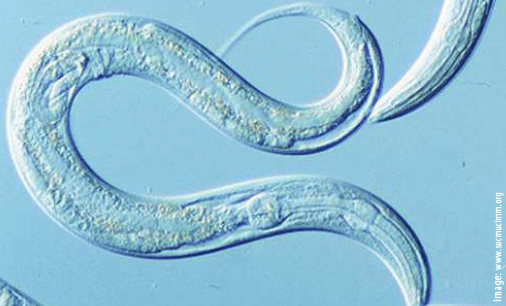 As a rule, your brain’s activity
doesn’t influence the physiological
development of your sex cells. In
simpler terms: What you 'think' can’t
be inherited. But now it looks like
we may need to rethink this rule for
at least one species. The activity of
nematode neurons has been shown
to influence the foraging behaviour
of the next generation of worms, and
it could be caused by a novel inheritance
pathway.
A team of scientists from Tel Aviv
University in Israel describes how
free-floating strands of RNA generated
inside roundworm (Caenorhabditis
elegans) neurons affect the way subsequent
generations sniff out their meals.
“We found that small RNAs convey
information derived from neurons to
the progeny and influence a variety of
physiological processes, including the
food-seeking behaviour of the progeny,”
says biologist Oded Rechavi.
Rechavi’s team confesses their main
goal is to challenge scientific dogmas,
especially those on inheritance. This
is certainly a big challenge to a longestablished
assumption in biology, so it
deserves heavy scrutiny before we accept
it. With that in mind, the discovery
is potentially huge: it could describe an
entirely new mechanism by which one
generation affects the physical state of
the next. ...
As a rule, your brain’s activity
doesn’t influence the physiological
development of your sex cells. In
simpler terms: What you 'think' can’t
be inherited. But now it looks like
we may need to rethink this rule for
at least one species. The activity of
nematode neurons has been shown
to influence the foraging behaviour
of the next generation of worms, and
it could be caused by a novel inheritance
pathway.
A team of scientists from Tel Aviv
University in Israel describes how
free-floating strands of RNA generated
inside roundworm (Caenorhabditis
elegans) neurons affect the way subsequent
generations sniff out their meals.
“We found that small RNAs convey
information derived from neurons to
the progeny and influence a variety of
physiological processes, including the
food-seeking behaviour of the progeny,”
says biologist Oded Rechavi.
Rechavi’s team confesses their main
goal is to challenge scientific dogmas,
especially those on inheritance. This
is certainly a big challenge to a longestablished
assumption in biology, so it
deserves heavy scrutiny before we accept
it. With that in mind, the discovery
is potentially huge: it could describe an
entirely new mechanism by which one
generation affects the physical state of
the next. ...
 The world’s first 100-percent
compostable sneakers have been
launched by Canadian shoe brand
Native Shoes. As the name ‘Plant Shoe’
suggests, the footwear is entirely created
from plants. The fact that it’s fully
biodegradable also means it will not
contribute to landfill.
The outsole of the Plant Shoe is
made of natural lactase hevea, with
a pineapple husk and organic cotton
upper, olive oil jute stitchwork, an
eucalyptus strobel board and a cork
midsole, kept together with latex glue.
Creative director Mike Belgue reveals
that while none of the materials
utilized are “particularly groundbreaking”
and have actually been around for
a long time, not many inventors have
turned to the past to come up with solutions
for the future. ...
The world’s first 100-percent
compostable sneakers have been
launched by Canadian shoe brand
Native Shoes. As the name ‘Plant Shoe’
suggests, the footwear is entirely created
from plants. The fact that it’s fully
biodegradable also means it will not
contribute to landfill.
The outsole of the Plant Shoe is
made of natural lactase hevea, with
a pineapple husk and organic cotton
upper, olive oil jute stitchwork, an
eucalyptus strobel board and a cork
midsole, kept together with latex glue.
Creative director Mike Belgue reveals
that while none of the materials
utilized are “particularly groundbreaking”
and have actually been around for
a long time, not many inventors have
turned to the past to come up with solutions
for the future. ...
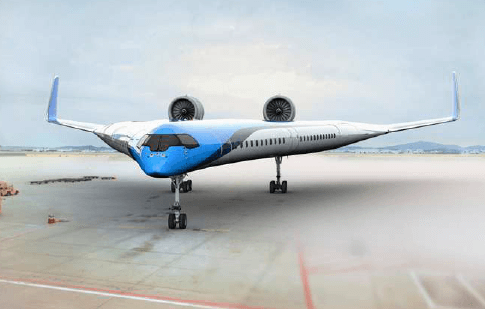 Dutch airline KLM has teamed
up with TU Delft to create the
Flying-V aircraft concept, which is
designed to consume 20 per cent less
fuel than Airbus’ A350. ...
The aircraft’s V-shaped design will
integrate the passenger cabin, the
cargo hold and the fuel tanks into the
wing structure. Compared to the Airbus
A350 —one of the most advanced
aircrafts of today— the long-distance
Flying-V aircraft concept is smaller,
giving it less aerodynamic drag and a
reduced weight.
According to KLM and TU Delft, this
means the aircraft will use 20 per cent
less fuel than the Airbus A350.
While the Flying-V concept is shorter
than the A350 at 55 m, it has the
same wingspan of 65 m, meaning it
will be able to use existing infrastructure
at airports like gates and runways,
and will fit into the same hangar as the
A350. It will also be able to carry the
same number of passengers —314 in
the standard configuration— and the
same 160 m3 of cargo volume.
“We are incredibly pleased to be able
to cooperate with our trusted partner
KLM on our combined mission to
make aviation more sustainable,” said
Henri Werij, dean of the Faculty of ...
Dutch airline KLM has teamed
up with TU Delft to create the
Flying-V aircraft concept, which is
designed to consume 20 per cent less
fuel than Airbus’ A350. ...
The aircraft’s V-shaped design will
integrate the passenger cabin, the
cargo hold and the fuel tanks into the
wing structure. Compared to the Airbus
A350 —one of the most advanced
aircrafts of today— the long-distance
Flying-V aircraft concept is smaller,
giving it less aerodynamic drag and a
reduced weight.
According to KLM and TU Delft, this
means the aircraft will use 20 per cent
less fuel than the Airbus A350.
While the Flying-V concept is shorter
than the A350 at 55 m, it has the
same wingspan of 65 m, meaning it
will be able to use existing infrastructure
at airports like gates and runways,
and will fit into the same hangar as the
A350. It will also be able to carry the
same number of passengers —314 in
the standard configuration— and the
same 160 m3 of cargo volume.
“We are incredibly pleased to be able
to cooperate with our trusted partner
KLM on our combined mission to
make aviation more sustainable,” said
Henri Werij, dean of the Faculty of ...
 The Dreyfuss retro-futurist phone
concept explores the iconic form
of the classic telephone combined
with modern materials, technologies,
and forms. The concept also pays
homage to Henry Dreyfuss (1904-1972),
a legendary 20th Century American
industrial designer, who worked extensively
on improving the look, feel
and function of products, ranging from
consumer to commercial. Dreyfuss is
seen as one of the pioneers of modern
product design and Human Centered
Design. The 1937 Bell 302 telephone,
one of his most famous work, is an
inspiration for this project.
The Dreyfuss retro-futurist phone
concept explores the iconic form
of the classic telephone combined
with modern materials, technologies,
and forms. The concept also pays
homage to Henry Dreyfuss (1904-1972),
a legendary 20th Century American
industrial designer, who worked extensively
on improving the look, feel
and function of products, ranging from
consumer to commercial. Dreyfuss is
seen as one of the pioneers of modern
product design and Human Centered
Design. The 1937 Bell 302 telephone,
one of his most famous work, is an
inspiration for this project.
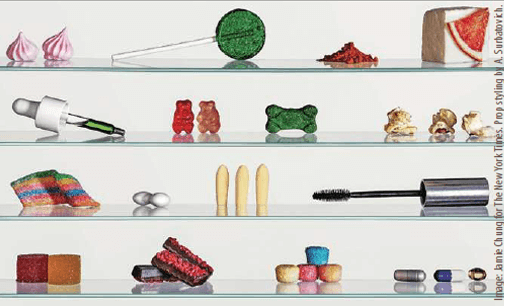 Cannabidiol is everywhere. We are
bombarded by a dizzying variety
of CBD-infused products: beers, gummies,
chocolates and marshmallows;
lotions to rub on aching joints; oils
to swallow; vaginal suppositories for
“soothing,” in one company’s words,
“the area that needs it most.” CVS and
Walgreens each recently announced
plans to sell CBD products in certain
states. Jason David now sells a cannabis
extract called Jayden’s Juice, named
for his son —one of several extracts on
the market, including Haleigh’s Hope
and Charlotte’s Web, that are named
after children who are said to have
benefited from being treated with CBD.
Many of these products are vague
about what exactly CBD can do. (The
F.D.A. prohibits unproven health
claims.) Yet promises abound on the
internet, where numerous articles and
testimonials suggest that CBD can effectively
treat not just epilepsy but also
anxiety, pain, sleeplessness, Crohn’s
disease, arthritis and even anger. A
confluence of factors has led to this
strange moment. Plenty of legitimate,
if still inconclusive, research is being
done on CBD. Many scientists are truly
excited about it. The laws governing
cannabis and its chemical components
have loosened up. And the anecdotes
that have emerged from what Elizabeth
Thiele, an epileptologist at Harvard,
calls the “vernacular” cannabis
movement have lent emotional force to
the claims made for CBD. ...
Read full text:
Cannabidiol is everywhere. We are
bombarded by a dizzying variety
of CBD-infused products: beers, gummies,
chocolates and marshmallows;
lotions to rub on aching joints; oils
to swallow; vaginal suppositories for
“soothing,” in one company’s words,
“the area that needs it most.” CVS and
Walgreens each recently announced
plans to sell CBD products in certain
states. Jason David now sells a cannabis
extract called Jayden’s Juice, named
for his son —one of several extracts on
the market, including Haleigh’s Hope
and Charlotte’s Web, that are named
after children who are said to have
benefited from being treated with CBD.
Many of these products are vague
about what exactly CBD can do. (The
F.D.A. prohibits unproven health
claims.) Yet promises abound on the
internet, where numerous articles and
testimonials suggest that CBD can effectively
treat not just epilepsy but also
anxiety, pain, sleeplessness, Crohn’s
disease, arthritis and even anger. A
confluence of factors has led to this
strange moment. Plenty of legitimate,
if still inconclusive, research is being
done on CBD. Many scientists are truly
excited about it. The laws governing
cannabis and its chemical components
have loosened up. And the anecdotes
that have emerged from what Elizabeth
Thiele, an epileptologist at Harvard,
calls the “vernacular” cannabis
movement have lent emotional force to
the claims made for CBD. ...
Read full text:
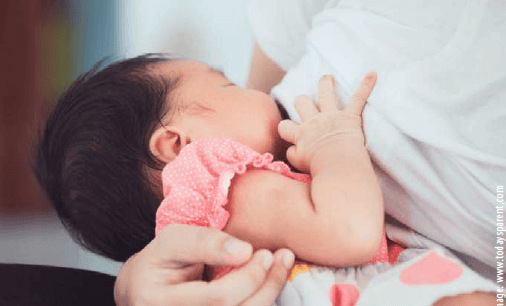 Breast-fed milk may nourish a baby’s
microbiome in ways that bottled
breast milk can’t. In the earliest days after
birth, millions of bacteria make their
home in a baby’s body —in the skin,
mouth and especially the gut. These
immigrants come from the birth canal
and the mother’s feces (during a vaginal
birth), the mother’s skin and mouth as
she holds and nuzzles the baby and perhaps
even from the placenta, although
that source is still debated.
The colonizing microbiome can have
a far-reaching impact on the baby’s
health. Studies have suggested, for
instance, that the populace of a baby’s
microbiome in the first two years of
life may predict later risk of obesity.
Children born by cesarean section are
also more likely to become obese, or to
develop autoimmune diseases such as
type 1 diabetes and asthma.
Lately, scientists have identified
another major contributor to the infant
microbiome. Breast milk, it turns out,
is teeming with bacteria that colonize
the infant’s gut, and could help set the
course for the baby’s growing immune
system and metabolism.
Moreover, breast milk seems to be
rich in beneficial bacteria only when
it comes directly from the mother’s
breast —not even when the same milk is
pumped and delivered later by bottle. ...
Read full text:
Breast-fed milk may nourish a baby’s
microbiome in ways that bottled
breast milk can’t. In the earliest days after
birth, millions of bacteria make their
home in a baby’s body —in the skin,
mouth and especially the gut. These
immigrants come from the birth canal
and the mother’s feces (during a vaginal
birth), the mother’s skin and mouth as
she holds and nuzzles the baby and perhaps
even from the placenta, although
that source is still debated.
The colonizing microbiome can have
a far-reaching impact on the baby’s
health. Studies have suggested, for
instance, that the populace of a baby’s
microbiome in the first two years of
life may predict later risk of obesity.
Children born by cesarean section are
also more likely to become obese, or to
develop autoimmune diseases such as
type 1 diabetes and asthma.
Lately, scientists have identified
another major contributor to the infant
microbiome. Breast milk, it turns out,
is teeming with bacteria that colonize
the infant’s gut, and could help set the
course for the baby’s growing immune
system and metabolism.
Moreover, breast milk seems to be
rich in beneficial bacteria only when
it comes directly from the mother’s
breast —not even when the same milk is
pumped and delivered later by bottle. ...
Read full text:
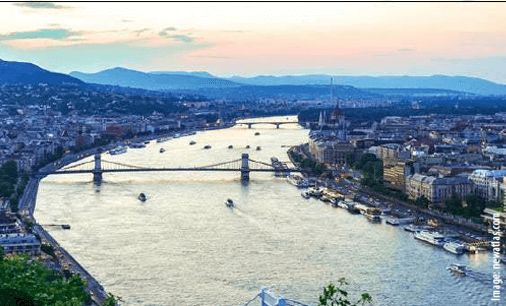
 Last October, Medha Chandorkar
decided to reckon with her wardrobe.
The 26-year-old's closet was
filled with clothes from H&M and
Forever21 —trendy and plentiful, but
also relatively cheap and disposable. ...
But Chandorkar, who lives in Arlington,
Virginia, and works for a startup,
was fed up with how the clothes felt,
and where they came from. “On many
levels I was dressing poorly and unethically,”
she said.
So she signed up for Rent the Runway,
the popular service that lets users
try dry-cleaned clothing for a month,
and got hooked. These days, Chandorkar
said, she owns half the clothes
she used to, spends $30 less per month
on shopping, and feels far better about
what she wears. “It's allowed me to be
creative,” she explained.
There is little hidden at this point
about the excess and inequity baked
into much of the fashion industry.
Americans threw away 81 pounds of
clothing a year per person, according
to one 2016 survey, fabric that generally
ends up in landfills or the ocean.
Meanwhile, ... workers in garment factories
—like the infamous Rana Factory
that burned down in Bangladesh
in 2013— are exploited and hurt in the
process of churning out fast fashion. ...
“Rental, the bigger it grows, will
have impacts on sustainability” said
Raymond Wimer, ...
Last October, Medha Chandorkar
decided to reckon with her wardrobe.
The 26-year-old's closet was
filled with clothes from H&M and
Forever21 —trendy and plentiful, but
also relatively cheap and disposable. ...
But Chandorkar, who lives in Arlington,
Virginia, and works for a startup,
was fed up with how the clothes felt,
and where they came from. “On many
levels I was dressing poorly and unethically,”
she said.
So she signed up for Rent the Runway,
the popular service that lets users
try dry-cleaned clothing for a month,
and got hooked. These days, Chandorkar
said, she owns half the clothes
she used to, spends $30 less per month
on shopping, and feels far better about
what she wears. “It's allowed me to be
creative,” she explained.
There is little hidden at this point
about the excess and inequity baked
into much of the fashion industry.
Americans threw away 81 pounds of
clothing a year per person, according
to one 2016 survey, fabric that generally
ends up in landfills or the ocean.
Meanwhile, ... workers in garment factories
—like the infamous Rana Factory
that burned down in Bangladesh
in 2013— are exploited and hurt in the
process of churning out fast fashion. ...
“Rental, the bigger it grows, will
have impacts on sustainability” said
Raymond Wimer, ...
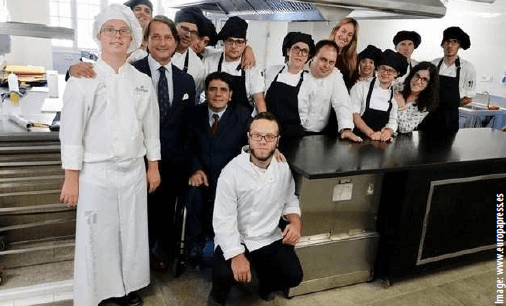 There is a restaurant in southern
Spain that is widely recognized for
having the most delicious food in the
area. Locals rave about it, and people
travel from far and wide to enjoy the
exquisite dishes. Sounds impressive,
right? Well, it’s called Universo Santi,
and every employee at the restaurant
has some kind of disability.
“I always wanted to show what
people with disabilities, given the right
training, were capable of,” Antonio
Vila told The Guardian. “They were
not represented in the world of haute
cuisine. Universo Santi has broken
through that barrier.”
Vila is the president of a nonprofit
organization that focuses on helping
people with disabilities get rewarding
jobs. He was a major driving force
behind opening Universo Santi, which
now has 20 employees who all have
some form of disability. The restaurant
hired from a list of 1,500 applicants, all
of whom had to be unemployed and
have more than a 35% disability.
“I feel really lucky to be part of this,”
Gloria Bazán said. She’s the restaurant’s
head of human resources and
has cerebral palsy. “It’s difficult to
work when society just sees you as
someone with a handicap,” Bazán said.
“This has given me the opportunity to
be independent and to participate like
any other human being.” ...
Read full text:
There is a restaurant in southern
Spain that is widely recognized for
having the most delicious food in the
area. Locals rave about it, and people
travel from far and wide to enjoy the
exquisite dishes. Sounds impressive,
right? Well, it’s called Universo Santi,
and every employee at the restaurant
has some kind of disability.
“I always wanted to show what
people with disabilities, given the right
training, were capable of,” Antonio
Vila told The Guardian. “They were
not represented in the world of haute
cuisine. Universo Santi has broken
through that barrier.”
Vila is the president of a nonprofit
organization that focuses on helping
people with disabilities get rewarding
jobs. He was a major driving force
behind opening Universo Santi, which
now has 20 employees who all have
some form of disability. The restaurant
hired from a list of 1,500 applicants, all
of whom had to be unemployed and
have more than a 35% disability.
“I feel really lucky to be part of this,”
Gloria Bazán said. She’s the restaurant’s
head of human resources and
has cerebral palsy. “It’s difficult to
work when society just sees you as
someone with a handicap,” Bazán said.
“This has given me the opportunity to
be independent and to participate like
any other human being.” ...
Read full text:
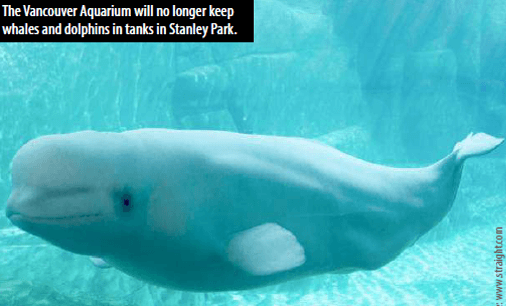 Canada made history today (June
10) with the passing of Bill S-203:
Ending the Captivity of Whales and
Dolphins Act. Bill S-203 will prohibit
breeding, imports, exports and live captures
of whales, dolphins and porpoises
across Canada, building on Ontario’s
Bill 80, which was passed on May 28,
2015. First sponsored in 2015 by Senator
Wilfred P. Moore (who has since
retired), it was carried forward by Senator
Murray Sinclair. After three years
of exhaustive debate, the bill received
approval in the Senate of Canada on
October 23, 2018. The bill was then
sponsored by Green Party leader Elizabeth
May (MP, Saanich-Gulf Islands) as
it moved into the House of Commons. Two aquariums in Canada currently
house captive cetaceans, including the
Vancouver Aquarium in British Columbia
and Marineland of Canada, in
Niagara Falls, Ontario. The following
cetaceans in their inventories will be
grandfathered into this legislation:
Vancouver Aquarium –one Pacific
white-sided dolphin (Helen)
Marineland of Canada –one orca
(Kiska), five bottlenose dolphins (Tsunami,
Echo, Lida, Sonar and Marina)
and approximately 55 beluga whales.
For well over three decades, Ric
O’Barry has vigorously supported local
efforts in Ontario to bring awareness ...
Canada made history today (June
10) with the passing of Bill S-203:
Ending the Captivity of Whales and
Dolphins Act. Bill S-203 will prohibit
breeding, imports, exports and live captures
of whales, dolphins and porpoises
across Canada, building on Ontario’s
Bill 80, which was passed on May 28,
2015. First sponsored in 2015 by Senator
Wilfred P. Moore (who has since
retired), it was carried forward by Senator
Murray Sinclair. After three years
of exhaustive debate, the bill received
approval in the Senate of Canada on
October 23, 2018. The bill was then
sponsored by Green Party leader Elizabeth
May (MP, Saanich-Gulf Islands) as
it moved into the House of Commons. Two aquariums in Canada currently
house captive cetaceans, including the
Vancouver Aquarium in British Columbia
and Marineland of Canada, in
Niagara Falls, Ontario. The following
cetaceans in their inventories will be
grandfathered into this legislation:
Vancouver Aquarium –one Pacific
white-sided dolphin (Helen)
Marineland of Canada –one orca
(Kiska), five bottlenose dolphins (Tsunami,
Echo, Lida, Sonar and Marina)
and approximately 55 beluga whales.
For well over three decades, Ric
O’Barry has vigorously supported local
efforts in Ontario to bring awareness ...

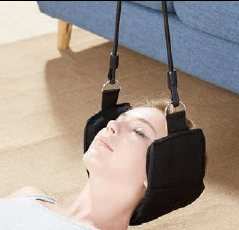 A cervical
traction device for stretching out
the muscles in your neck. Adjustable to
hang at the right height from a doorknob
or railing. www.thegrommet.com
A cervical
traction device for stretching out
the muscles in your neck. Adjustable to
hang at the right height from a doorknob
or railing. www.thegrommet.com
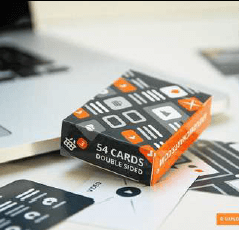 Create
your own web page structure by using
up to 54 double-sided wireframe cards,
take a photo shoot and send it to your
client. by UX Flowcharts. bza.co
Create
your own web page structure by using
up to 54 double-sided wireframe cards,
take a photo shoot and send it to your
client. by UX Flowcharts. bza.co
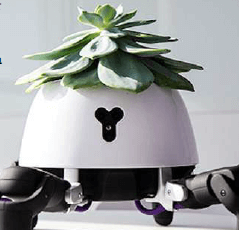 Robot planter
follows the sunlight & throws
tantrums if you don't water it.
By Vincross. www.bustle.com
Robot planter
follows the sunlight & throws
tantrums if you don't water it.
By Vincross. www.bustle.com
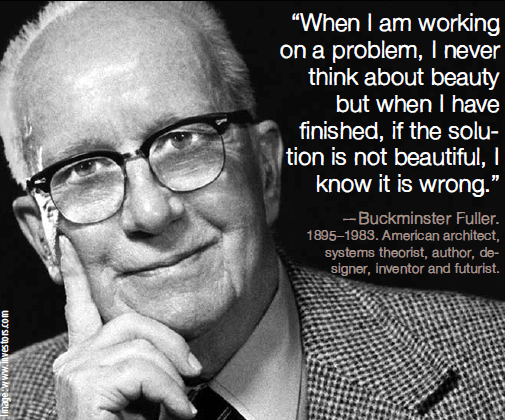 “When I am working
on a problem, I never
think about beauty
but when I have
finished, if the solution
is not beautiful, I
know it is wrong.”
“When I am working
on a problem, I never
think about beauty
but when I have
finished, if the solution
is not beautiful, I
know it is wrong.”

 The Master of Sociology (MA,
MS) program objective is to help
students develop professionally by employing
analytical and research skills
through the use of research methods,
research experience, and analytical
skills necessary for the employment in
government, nonprofit, and corporate
organizations. The Master of Sociology
program is offered online via distance
learning. After evaluating both academic
record and life experience, AIU
staff working in conjunction with Faculty
and Academic Advisors will assist
students in setting up a custom-made
program, designed on an individual
basis. This flexibility to meet student
needs is seldom found in other distance
learning programs. Our online
program does not require all students
to take the same subjects/courses, use
the same books, or learning materials.
Instead, the online Master of Sociology
curriculum is designed individually
by the student and academic advisor.
It specifically addresses strengths and
weaknesses with respect to market opportunities
in the student’s major and
intended field of work.
Understanding that industry and
geographic factors should influence
the content of the curriculum instead
of a standardized one-fits-all design
is the hallmark of AIU’s unique
approach to adult education. This
philosophy addresses the dynamic and
constantly changing environment of
working professionals by helping adult
students in reaching their professional
and personal goals within the scope of
the degree program.
The Master of Sociology (MA,
MS) program objective is to help
students develop professionally by employing
analytical and research skills
through the use of research methods,
research experience, and analytical
skills necessary for the employment in
government, nonprofit, and corporate
organizations. The Master of Sociology
program is offered online via distance
learning. After evaluating both academic
record and life experience, AIU
staff working in conjunction with Faculty
and Academic Advisors will assist
students in setting up a custom-made
program, designed on an individual
basis. This flexibility to meet student
needs is seldom found in other distance
learning programs. Our online
program does not require all students
to take the same subjects/courses, use
the same books, or learning materials.
Instead, the online Master of Sociology
curriculum is designed individually
by the student and academic advisor.
It specifically addresses strengths and
weaknesses with respect to market opportunities
in the student’s major and
intended field of work.
Understanding that industry and
geographic factors should influence
the content of the curriculum instead
of a standardized one-fits-all design
is the hallmark of AIU’s unique
approach to adult education. This
philosophy addresses the dynamic and
constantly changing environment of
working professionals by helping adult
students in reaching their professional
and personal goals within the scope of
the degree program.
 Atlantic International University is accredited by the Accreditation Service for International
Schools, Colleges and Universities (ASIC). ASIC Accreditation is an internationally
renowned quality standard for colleges and universities. Visit ASIC’s Directory of Accredited
Colleges and Universities. ASIC is a member of CHEA International Quality Group
(CIQG) in the USA, an approved accreditation body by the Ministerial Department of the Home Office
in the UK, and is listed in the International Directory of the Council for Higher Education Accreditation
(CHEA). The University is based in the United States and was established by corporate charter in 1998.
Atlantic International University is accredited by the Accreditation Service for International
Schools, Colleges and Universities (ASIC). ASIC Accreditation is an internationally
renowned quality standard for colleges and universities. Visit ASIC’s Directory of Accredited
Colleges and Universities. ASIC is a member of CHEA International Quality Group
(CIQG) in the USA, an approved accreditation body by the Ministerial Department of the Home Office
in the UK, and is listed in the International Directory of the Council for Higher Education Accreditation
(CHEA). The University is based in the United States and was established by corporate charter in 1998.
 In some cases, accredited colleges
may not accept for transfer courses and degrees
completed at unaccredited colleges, and some
employers may require an accredited degree as
a basis for eligibility for employment. Potential
students should consider how the above may affect
their interests, AIU respects the unique rules and
regulations of each country and does not seek to
influence the respective authorities. In the event
that a prospective student wishes to carry out any
government review or process in regards to his
university degree, we recommend that the requirements
of such are explored in detail with the relevant
authorities by the prospective student as the
university does not intervene in such processes.
AIU students can be found in over 180 countries,
they actively participate and volunteer
in their communities as part of their academic
program and have allocated thousands of service
hours to diverse causes and initiatives. AIU
programs follow the standards commonly used by
colleges and universities in the United States with
regards to the following: academic program
structure, degree issued, transcript, and
other graduation documents.
AIU graduation documents can include
an apostille and authentication from the
US Department of State to facilitate their
use internationally.
In some cases, accredited colleges
may not accept for transfer courses and degrees
completed at unaccredited colleges, and some
employers may require an accredited degree as
a basis for eligibility for employment. Potential
students should consider how the above may affect
their interests, AIU respects the unique rules and
regulations of each country and does not seek to
influence the respective authorities. In the event
that a prospective student wishes to carry out any
government review or process in regards to his
university degree, we recommend that the requirements
of such are explored in detail with the relevant
authorities by the prospective student as the
university does not intervene in such processes.
AIU students can be found in over 180 countries,
they actively participate and volunteer
in their communities as part of their academic
program and have allocated thousands of service
hours to diverse causes and initiatives. AIU
programs follow the standards commonly used by
colleges and universities in the United States with
regards to the following: academic program
structure, degree issued, transcript, and
other graduation documents.
AIU graduation documents can include
an apostille and authentication from the
US Department of State to facilitate their
use internationally.
 The School of Business and Economics
allows aspiring and practicing
professionals, managers, and entrepreneurs
in the private and public sectors
to complete a self paced distance
learning degree program of the highest
academic standard.
The ultimate goal is to empower
learners and help them take advantage
of the enormous array of resources
from the world environment in order
to eliminate the current continuum of
poverty and limitations.
Degree programs are designed for
those students whose professional experience has been in business,
marketing, administration, economics,
finance and management.
The School of Business and Economics
allows aspiring and practicing
professionals, managers, and entrepreneurs
in the private and public sectors
to complete a self paced distance
learning degree program of the highest
academic standard.
The ultimate goal is to empower
learners and help them take advantage
of the enormous array of resources
from the world environment in order
to eliminate the current continuum of
poverty and limitations.
Degree programs are designed for
those students whose professional experience has been in business,
marketing, administration, economics,
finance and management.
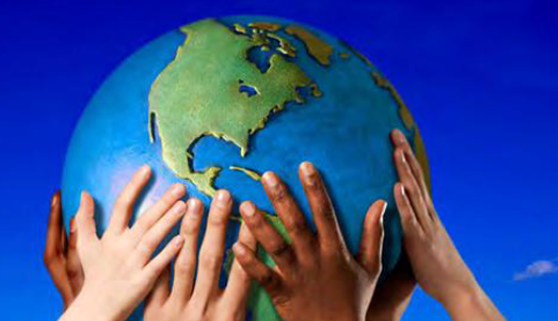 The School of Social and Human Studies
is focused on to the development of
studies which instill a core commitment
to building a society based on social and
economic justice and enhancing opportunities
for human well being.
The founding principles lie on the
basic right of education as outlined
in the Declaration of Human Rights.
We instill in our students a sense of
confidence and self reliance in their
ability to access the vast opportunities
available through information channels,
the world wide web, private, public,
nonprofit, and nongovernmental organizations in an ever expanding
global community.
Degree programs are aimed towards
those whose professional life has been
related to social and human behavior,
with the arts, or with cultural studies.
The School of Social and Human Studies
is focused on to the development of
studies which instill a core commitment
to building a society based on social and
economic justice and enhancing opportunities
for human well being.
The founding principles lie on the
basic right of education as outlined
in the Declaration of Human Rights.
We instill in our students a sense of
confidence and self reliance in their
ability to access the vast opportunities
available through information channels,
the world wide web, private, public,
nonprofit, and nongovernmental organizations in an ever expanding
global community.
Degree programs are aimed towards
those whose professional life has been
related to social and human behavior,
with the arts, or with cultural studies.
 The School of Science and Engineering
seeks to provide dynamic, integrated,
and challenging degree programs
designed for those whose experience
is in industrial research, scientific production,
engineering and the general
sciences. Our system for research and
education will keep us apace with the
twenty-first century reach scientific
advance in an environmentally and
ecologically responsible manner to allow
for the sustainability of the human
population. We will foster among our
students a demand for ethical behavior,
an appreciation for diversity, an understanding
of scientific investigation,
The School of Science and Engineering
seeks to provide dynamic, integrated,
and challenging degree programs
designed for those whose experience
is in industrial research, scientific production,
engineering and the general
sciences. Our system for research and
education will keep us apace with the
twenty-first century reach scientific
advance in an environmentally and
ecologically responsible manner to allow
for the sustainability of the human
population. We will foster among our
students a demand for ethical behavior,
an appreciation for diversity, an understanding
of scientific investigation,
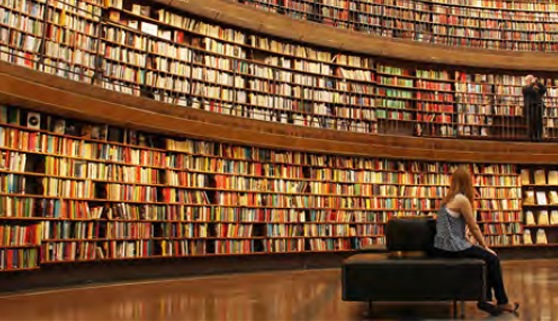 With access to a global catalog created and maintained collectively by more than
9,000 participating institutions, AIU students have secured excellent research
tools for their study programs.
With access to a global catalog created and maintained collectively by more than
9,000 participating institutions, AIU students have secured excellent research
tools for their study programs.